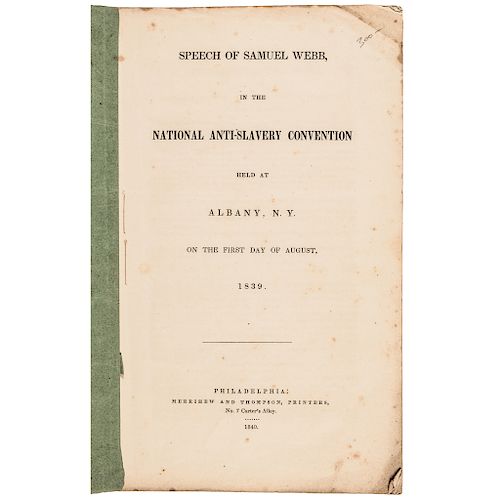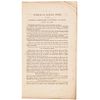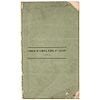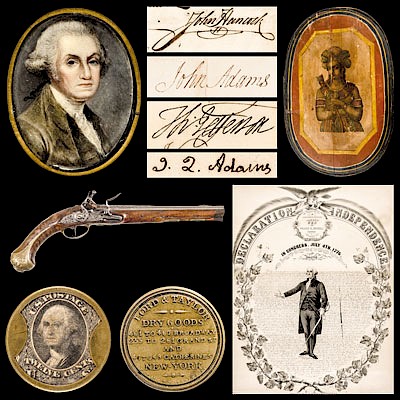1839 Imprint: Speech of Samuel Webb, in the National Anti-Slavery Convention
Lot 270
Estimate:
$400 - $500
Absentee vs Live bid
Two ways to bid:
- Leave a max absentee bid and the platform will bid on your behalf up to your maximum bid during the live auction.
- Bid live during the auction and your bids will be submitted real-time to the auctioneer.
Bid Increments
| Price | Bid Increment |
|---|---|
| $0 | $10 |
| $200 | $20 |
| $300 | $25 |
| $500 | $50 |
| $1,000 | $100 |
| $2,000 | $200 |
| $3,000 | $250 |
| $5,000 | $500 |
| $10,000 | $1,000 |
| $20,000 | $2,000 |
| $30,000 | $2,500 |
| $50,000 | $5,000 |
| $100,000 | $10,000 |
| $200,000 | $20,000 |
| $300,000 | $25,000 |
| $500,000 | $50,000 |
About Auction
By Early American History Auctions
Jun 1, 2019
Set Reminder
2019-06-01 12:00:00
2019-06-01 12:00:00
America/New_York
Bidsquare
Bidsquare : Historic Autographs, Colonial Currency, Political Americana & Revolutionary War Era
https://www.bidsquare.com/auctions/early-american-history-auctions/historic-autographs-colonial-currency-political-americana-revolutionary-war-era-4152
Historic Autographs, Coins, Currency, Political, Americana, Historic Weaponry and Guns, John Adams, Thomas Jefferson, Early American History Auctions auctions@earlyamerican.com
Historic Autographs, Coins, Currency, Political, Americana, Historic Weaponry and Guns, John Adams, Thomas Jefferson, Early American History Auctions auctions@earlyamerican.com
- Lot Description
Black History
1839 "Speech in the National Anti-Slavery Convention" at Albany, NY Calling for the Immediate Abolition of Slavery
August 1, 1839-Dated, Rare Original Imprint titled, "Speech of Samuel Webb, in the National Anti-Slavery Convention, at Albany, N.Y. On The First Day Of August, 1839. - Philadelphia, Merrihew and Thompson, Printers, 1840", Fine.
Samuel Webb, Philadelphia, Pennsylvania, Abolitionist, American Anti-Slavery Society, Manager (1840-41) and founding member of "The Pennsylvania Hall Association," a stockholders association formed in 1837 to erect a building in Philadelphia dedicated "to Liberty and the Rights of Man." This is an original Imprint, which measures about 5.5" x 9", with 20 pages, plus its somewhat torn green paper front cover (lacking the back wrap), light foxing throughout and folded page corners from actual use, sewn spine, otherwise complete. Samuel Webb, Chairman of the Business Committee gave this historic Speech at the National Anti-Slavery Convention held in Albany, NY. on August 1, 1839. Excerpt from the speech, in part:
"...Let us no longer prostrate ourselves before the South in the humble and despised attitude of petitioners, but arising in the native majesty of freemen, let us say to the haughty southron: Thus far shalt thou go, but no farther. Let us avail ourselves of the power which belongs to us as American citizens - and by a proper, firm, independent, and unanimous use of the elective franchise, make them hear us through the ballot-box,....".
Reproduced digital copies are available online. This is the very rare original.
American Anti-Slavery Society (AASS), founded in New York City, December 1833, disbanded 1870; published The Emancipator and The Anti-Slavery Standard; had 1,350 affiliated societies and 250,000 members in 1838.
By 1840, there were 2,000 affiliated societies. The Anti-Slavery Society was part of a larger religious revival that believed that slavery was a sin and that slave-holders were sinners. In addition,it was part of a reform movement of the period, which included women's rights, temperance, and prison reform. It had agents that traveled throughout the country producing lectures, distributing anti-slavery journals, and organizing local anti-slavery societies. It petitioned Congress to end slavery immediately in the District of Columbia and in any Federal territories.
There was much opposition to the Anti-Slavery Society in the North, especially from business owners who depended on imports from the slave states. Ultimately, the American Anti-Slavery Society was the largest and most influential abolitionist organization in the United States. Officers and representatives of the AASS were often members of other abolitionist and anti-slavery organizations as well
- Shipping Info
-
Early American provides in-house worldwide shipping. Please contact us directly if you have questions about your specific shipping requirements.
-
- Buyer's Premium



 EUR
EUR CAD
CAD AUD
AUD GBP
GBP MXN
MXN HKD
HKD CNY
CNY MYR
MYR SEK
SEK SGD
SGD CHF
CHF THB
THB













